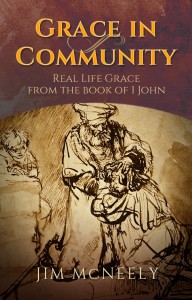Grace in Community
Real-life grace from the book of 1 John
Available for sale on Amazon, Barnes and Nobles, and Apple’s iBooks.
It is easy to treat the concept of grace as mere theory, but grace is the door to genuine Christian living! In Grace in Community, Jim McNeely flips our view of grace on its head and shows that grace isn’t theoretical—it is real life.
Christianity finds its true expression in community (“A new commandment I give you, that you love one another.”) God’s radical love-torn grace is the beating heart and narrow gate to close and enduring relationships between imperfect people.
Too often we find ourselves withholding love from others because we judge their actions. We accept grace vertically from God but struggle to believe in the power of that grace horizontally between ourselves and those around us. If we start seeing others as Jesus did, as people worth dying for, then we can begin to see grace work out in real life relationships.
In this exploration of 1 John, Jim McNeely considers the difference between moral pretense and authentic community, the significance of the grace God has shown us, and what that might look like in our everyday lives.
The point of walking in the light is fellowship, or community. If I believe the blood of Jesus only cleanses me personally from sin, and not that it cleanses us all from sin, then I have not heeded the message John heard from Jesus. It is a community cleansing, and this is the power of the thing. We cannot together step into the revealing light without it. There is no such thing as personal holiness; if all are not cleansed, then none are cleansed. The direct result of the cleansing is love, and love involves community. The idea of a particularly holy leader who prods and cajoles many less holy people into a somewhat greater obedience may be a Mosaic idea, but it is not a Christian one. In the community of grace, “You all know” (1 John 2:20). The main result of our individual guilt is to retreat from this fellowship of light into an isolation of pretense, darkness, and fear. If love is not perfect persistent one-way love which forgives all, it is not really love at all; it is conditional use. The love of God is persistent one-way love. It knows all and still loves. With this kind of love as the basis, there is going to be a persistent and ongoing intimacy, and challenges to relationship will be met not with outrage and rejection, but with mercy and belief in the continued sufficiency of Jesus’ blood. You can find this idea of grace in community in every passage of 1 John.
Grace in Community, from the foreword

